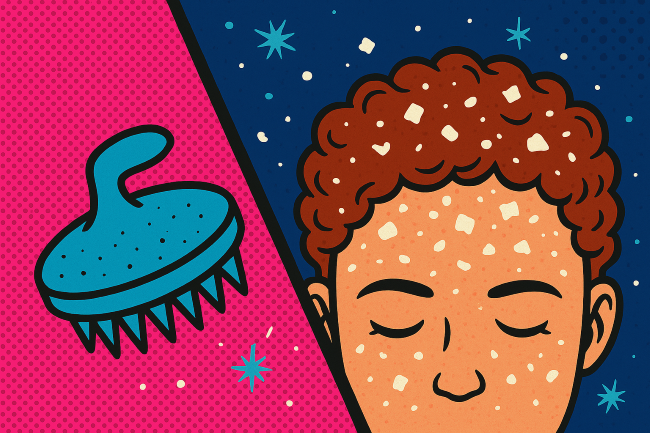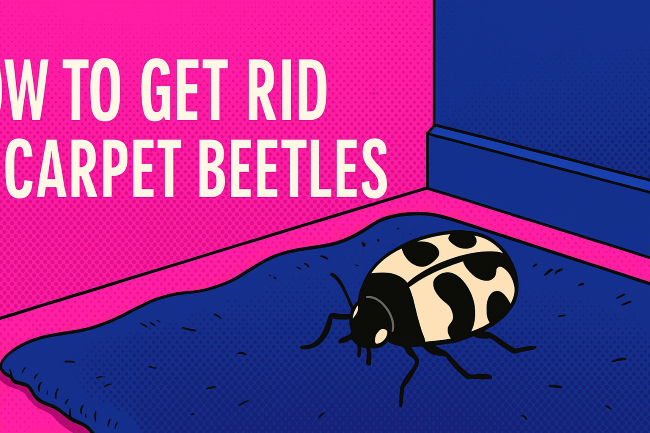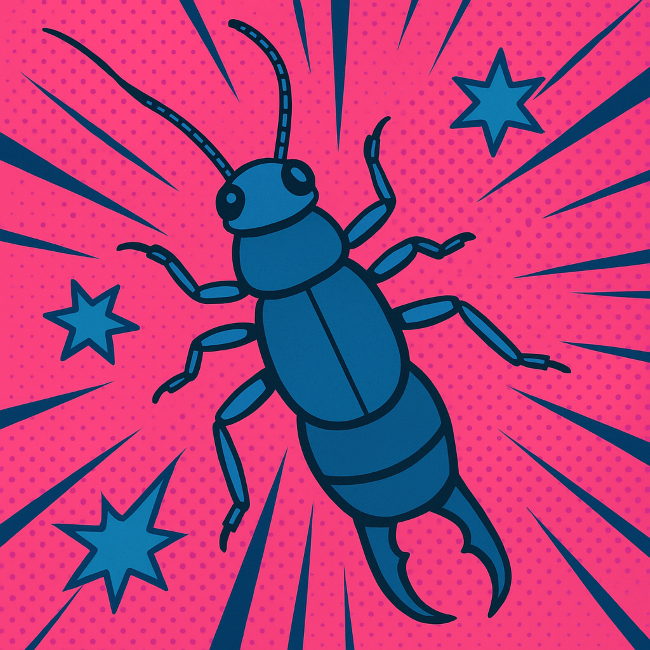How To Get Rid of Dandruff: Simple Solutions to Conquer a Healthy Scalp
Dandruff is a common problem that affects nearly 50% of the global population. It leaves behind embarrassing flakes and itchiness. It’s hard to get rid of.

We’re here to help you fight dandruff with simple solutions. Our goal is to make it easy and fun to say goodbye to dandruff. We want to make understanding and beating dandruff entertaining and less scary.
Key Takeaways
- Understand the causes of dandruff and its effects on the scalp.
- Discover simple, effective solutions to get rid of dandruff.
- Learn how to maintain a healthy scalp and prevent future dandruff issues.
- Explore the importance of scalp care in overall hair health.
- Find out how to choose the right products for your scalp type.
🧠 Understanding Dandruff: What It Is and Why It Happens
Dandruff is like the unwanted guest at your scalp party. But don’t fret, we’re here to make it leave. First, we need to know what it is and why it shows up.
The Science Behind Those Pesky Flakes
Dandruff isn’t just dry skin; it’s a mild form of seborrheic dermatitis. It’s caused by many things, like fungal infections and hair product sensitivity. For example, a fungus called Malassezia can irritate your scalp by breaking down scalp oils, causing flakes.
Common Misconceptions About Dandruff
Many think dandruff comes from poor hygiene or a dry scalp. But it’s more complex. Dandruff has oily flakes and can cause redness. Let’s clear up these myths for a better understanding.
Dandruff vs. Dry Scalp: Spotting the Difference
How do you tell dandruff from dry scalp? Dry scalp flakes are smaller and drier. Dandruff flakes are larger and oilier. Knowing this helps find the right treatment. For more info, check out www.getridofff.com.
🔍Identifying the Root Causes of Your Dandruff
To tackle dandruff, we need to find out what’s causing it. It’s like solving a mystery. We must gather all clues. Research shows that a yeast called Malassezia is a big player in dandruff. But, other things like dry skin, diet, and lifestyle also play a part.
Fungal Infections: The Malassezia Factor
Malassezia is a fungus found on our scalps. Sometimes, it grows too much and causes dandruff. This can happen due to stress, hormonal changes, or bad hair care.
Experts say, “Malassezia feeds on our scalp oils. It breaks them down into fatty acids and other stuff that can irritate the scalp and cause flaking.”
“The relationship between Malassezia and dandruff is complex, and understanding this link is crucial for effective treatment.”
Dry Skin and Environmental Triggers
Dry skin is a common cause of dandruff. When our scalp is dry, it flakes easily. Cold weather, dry air, and harsh hair products can make our scalp dry and flaky.
Diet and Lifestyle Influences
Our diet and lifestyle can also affect dandruff. Eating foods high in sugar, dairy, and processed ingredients can cause inflammation. Stress is another lifestyle factor that can make dandruff worse.
Hormonal Imbalances and Their Impact
Hormonal changes can also affect our scalp health. Changes in hormone levels, like during puberty, menopause, or pregnancy, can lead to dandruff. For more information on managing dandruff, you can visit www.getridofff.com.
🧴How to Get Rid of Dandruff with Medicated Shampoos
Many of us struggle with dandruff, but medicated shampoos can help. Flaking, itching, and white flakes on our shoulders are common issues. But, there’s hope!
Active Ingredients That Actually Work
Not all medicated shampoos are the same. Their success depends on their active ingredients. Zinc pyrithione fights yeast-like fungus that causes dandruff. Ketoconazole stops fungal growth on the scalp. Salicylic acid removes scales and reduces inflammation.
How to Properly Use Anti-Dandruff Shampoos
Using medicated shampoos right is key. Wet your hair first, then apply the shampoo to your scalp. Massage it gently, without scrubbing too hard. Leave it on for a few minutes before rinsing. Use it 2-3 times a week for best results.
When to Expect Results
Be patient with medicated shampoos. It may take weeks to see improvements. Don’t worry if you don’t see results right away. Keep using it, and you’ll notice a change.
Rotation Strategy for Maximum Effectiveness
To keep your scalp healthy, try rotating between different medicated shampoos. This prevents fungus from becoming resistant to one ingredient. For example, switch between zinc pyrithione and ketoconazole shampoos. This strategy can greatly help in fighting dandruff.
🏆 Top 5 Over-the-Counter Dandruff Shampoos Worth Trying
Get rid of dandruff with our top picks for over-the-counter shampoos. It’s hard to pick the right one with so many choices. We’re here to guide you to the best dandruff-fighting shampoo for your scalp.
Zinc Pyrithione-Based Products
Zinc pyrithione is a key ingredient in many dandruff shampoos. It fights flaking, inflammation, and has antifungal properties. Head & Shoulders Classic Clean and Paul Mitchell Tea Tree Special Shampoo are great options. They’re gentle for daily use and easy to find at drugstores.
Ketoconazole Formulations
Ketoconazole fights fungal infections, including dandruff. Nizoral A-D is a popular over-the-counter ketoconazole shampoo. It’s perfect for persistent dandruff or scalp irritation.
Coal Tar Shampoos
Coal tar treats dandruff and scalp conditions by slowing skin cell growth. Neutrogena T/Gel Therapeutic Shampoo is a gentle and effective coal tar shampoo.
Selenium Sulfide Options
Selenium sulfide is an antifungal ingredient in dandruff shampoos. It reduces flaking and inflammation and prevents dandruff return. Selsun Blue Medicated Treatment is a well-known selenium sulfide shampoo.
Salicylic Acid Treatments
Salicylic acid treats dandruff by exfoliating the scalp. It removes dead skin cells and reduces flaking. Dove Dandruff Care is a gentle and effective salicylic acid shampoo.
Choosing the right over-the-counter dandruff shampoo depends on your scalp type and needs. Whether you need a gentle or intense treatment, there’s a shampoo for you. Always follow the instructions and give the shampoo time to work. With the right shampoo and patience, you can say goodbye to dandruff for good!
🌿 Natural Remedies for Dandruff That Actually Work
Ready to fight dandruff with nature’s help? Looking for alternatives to harsh shampoos? Natural remedies can be just as good, if not better, than chemical ones.
Tea Tree Oil: Nature’s Antifungal
Tea tree oil fights off the fungus that causes dandruff. Add a few drops to your shampoo or use a shampoo with tea tree oil for its benefits.
Apple Cider Vinegar Rinses
Apple cider vinegar balances your scalp’s pH, stopping fungus growth. Use equal parts water and apple cider vinegar as a final rinse after shampooing to fight dandruff.
Aloe Vera Treatments
Aloe vera soothes an itchy scalp. Apply aloe vera gel to your scalp, leave it on for 30 minutes, then rinse well.
Coconut Oil Scalp Massages
Coconut oil moisturizes and fights fungus. Massage it into your scalp, leave overnight, and shampoo in the morning for best results.
Proper Application Techniques for Best Results
For these remedies to work, apply them right. Massage into your scalp well and leave on as directed before rinsing. Regular use is key for lasting results.
Adding these natural remedies to your hair care can manage dandruff and keep your scalp healthy. Visit www.getridofff.com for more tips and products to fight dandruff.
🛠️ DIY Home Treatments to Combat Flaky Scalp
Get rid of dandruff with these easy DIY treatments. You don’t need expensive products or salon visits. We’ll show you how to use common items to keep your scalp flake-free.
Baking Soda Scrubs
Baking soda is great for removing dead skin and reducing flakes. Just mix 1 tablespoon of baking soda with your shampoo. Massage it into your scalp, then rinse well. You’ll be on your way to a healthier scalp.
Essential Oil Blends for Scalp Health
Tea tree oil and lavender oil are good for your scalp. They have antifungal and soothing effects. Mix a few drops of these oils with coconut or olive oil. Massage it into your scalp to reduce inflammation and promote health.
Yogurt and Honey Masks
Yogurt and honey are perfect for your scalp. Yogurt balances your scalp’s pH, while honey soothes irritations. Mix equal parts yogurt and honey, apply to your scalp, and leave it on for 30 minutes before rinsing.
Lemon Juice Solutions
Lemon juice fights dandruff-causing fungi. Mix equal parts lemon juice and water as a final rinse after shampooing. The acidity helps balance your scalp’s pH and reduces flakes.
Try these DIY treatments and say goodbye to dandruff. Visit www.getridofff.com for more tips on a healthy scalp.
🌞 Lifestyle Changes to Prevent Dandruff Recurrence
Starting our journey to a flake-free scalp is easy with a few simple lifestyle changes. To keep dandruff away, we need to tackle the root causes. We also need to adjust our daily habits.
Stress Management Techniques for Scalp Health
Stress can make dandruff worse. So, managing stress is key. Try meditation, yoga, or a simple walk to reduce stress. These can help keep your scalp healthy.
Dietary Adjustments That Support a Healthy Scalp
Eating a balanced diet full of vitamins and minerals is vital for scalp health. Foods rich in omega-3 fatty acids, zinc, and vitamin B are especially good. Let’s make some dietary adjustments to nourish our scalp.
Proper Hair Care Routines
Choosing the right hair care products and techniques is important. Washing your hair with a gentle shampoo and avoiding harsh products can prevent dandruff.
The Impact of Hair Tools and Products
The tools and products we use on our hair can affect our scalp. For example, using a wide-tooth comb instead of a regular comb can reduce irritation. Be gentle with your hair and pick products that fit your scalp type. Visit www.getridofff.com for more tips.
👨⚕️When to See a Dermatologist About Your Dandruff
Dandruff can be a real nuisance; here’s when you should consider seeing a dermatologist. If your dandruff persists or worsens despite trying various treatments, it’s time to seek professional help.
Signs Your Dandruff Needs Professional Attention
If you experience severe itching, redness, or if your dandruff is accompanied by other symptoms like hair loss, it may be time to consult a dermatologist. Prescription-strength treatments might be necessary to tackle the underlying cause.
What to Expect During a Dermatologist Visit
During your visit, the dermatologist will examine your scalp, possibly perform some tests, and recommend a treatment plan tailored to your needs. They might prescribe a stronger medicated shampoo or other treatments.
Prescription-Strength Solutions
These can include stronger antifungal medications or steroids to reduce inflammation. Your dermatologist might also suggest lifestyle changes to help manage dandruff.
💇♀️Special Considerations for Different Hair Types
Tackling dandruff isn’t a one-size-fits-all solution, especially with different hair types. What works for straight, oily hair might not be right for curly, dry hair. We need a more detailed approach.
Dandruff Solutions for Curly and Textured Hair
For curly and textured hair, focus on gentle, moisturizing treatments. Avoid harsh products that take away natural oils. Sulfate-free shampoos and deep conditioning treatments are key. Ingredients like coconut oil and shea butter help keep the scalp hydrated and flake-free.
Addressing Dandruff with Colored or Treated Hair
If you have colored or chemically treated hair, be extra careful with dandruff treatments. Color-safe shampoos are essential. Avoid harsh anti-dandruff products that can damage the color. Instead, choose gentle, sulfate-free formulas made for colored hair.
Managing Dandruff with Sensitive Scalp
For sensitive scalps, finding a gentle yet effective dandruff solution is key. Look for hypoallergenic or fragrance-free products to avoid irritation. Tea tree oil is a natural antifungal agent, but use it diluted to prevent irritation.
Seasonal Adjustments for Year-Round Control
Dandruff can change with the seasons. Dry winter air can make flakiness worse, while humid summer months can cause oiliness and irritation. Adjust your scalp care routine: more moisturizing in winter, and more oil-controlling in summer. Stay on top of your scalp’s needs for year-round dandruff control.

⚡Quick Fixes: How to Get Rid of Dandruff Fast
Dandruff can pop up when you least expect it. Here’s how to quickly tackle it. Sometimes, you need a fast fix to get rid of dandruff. We’re here to help, whether it’s for a special occasion or just to feel normal again.
Emergency Dandruff Solutions for Immediate Relief
When dandruff hits out of nowhere, you need something fast. Anti-dandruff shampoos with zinc pyrithione or ketoconazole work quickly. They reduce flaking and inflammation, making your scalp normal again fast.
Camouflaging Techniques for Special Occasions
For quick cover-ups, try a scalp serum or dandruff camouflage spray. These can be a lifesaver for special occasions or important events.
Intensive Overnight Treatments
For a deeper fix, try an overnight treatment. Use products with tea tree oil or coconut oil before bed. By morning, your scalp should feel much better.
Products That Deliver Results in 24 Hours
Some products work in just 24 hours. Look for shampoos and treatments with salicylic acid or selenium sulfide. These ingredients are fast at fighting dandruff.
Conclusion: Maintaining a Flake-Free, Healthy Scalp
We’ve explored a lot to fight dandruff – from its causes to treatments. Now, let’s put it all together for a healthy scalp.
To keep your scalp healthy, stick to a consistent hair care routine. Also, make a few simple lifestyle changes. Visit www.getridofff.com for more tips on preventing dandruff.
Use the right treatments like medicated shampoos and natural remedies. Also, manage stress and eat right. This way, you can say goodbye to dandruff for good. Keeping your scalp flake-free is a journey, but with the right steps, you can succeed.
Stay alert to your scalp health and take steps to prevent flaky scalp issues. With these tips, you’re on your way to a healthier, happier scalp.
FAQ
What is dandruff, and what causes it?
Dandruff is a scalp condition that makes flakes of dead skin. It’s often caused by fungal infections, dry skin, and environmental factors. Diet, lifestyle, and hormonal imbalances also play a role.
How do I know if I have dandruff or a dry scalp?
Dandruff often causes redness, itchiness, and irritation. Dry scalp might just flake without these symptoms. Check our section on understanding dandruff to learn more.
What’s the best dandruff shampoo for my hair type?
The best shampoo depends on your hair type and dandruff severity. We list the top 5 over-the-counter shampoos. They include zinc pyrithione and ketoconazole options.
Are natural remedies effective in treating dandruff?
Yes, natural remedies like tea tree oil and apple cider vinegar can help. Aloe vera and coconut oil are also effective. We explain how to use them for the best results.
Can I make my own dandruff treatment at home?
Absolutely! We show you how to make baking soda scrubs and essential oil blends. These DIY treatments use common household ingredients to fight flaky scalp.
How can I prevent dandruff from coming back?
To prevent dandruff, manage stress and adjust your diet. Proper hair care routines are also key. We discuss these changes in detail to support a healthy scalp.
When should I see a dermatologist about my dandruff?
See a dermatologist if dandruff persists or worsens. We explain when it’s time to seek professional help and what to expect.
Can I still color or treat my hair if I have dandruff?
Yes, but consider special care for dandruff with colored or treated hair. We offer tips on managing dandruff while keeping your hair’s color or treatment.
How can I get rid of dandruff fast for a special occasion?
We’ve got emergency solutions for dandruff. Learn how to camouflage and use overnight treatments for a flake-free scalp in no time.
How long does it take to see results from dandruff treatment?
Results from dandruff treatment vary by treatment and severity. We guide you on when to expect results from medicated shampoos and other treatments.
✅ Final Thoughts
Dandruff may be stubborn, but it’s not unbeatable. With the right mix of medicated shampoos, natural treatments, and simple lifestyle tweaks, you can restore balance to your scalp and confidence to your routine.
Whether you’re dealing with dry flakes or stubborn buildup, consistency is key. Rotate your shampoos, treat your scalp gently, and feed your body what it needs to thrive.
Want more no-flake fixes and healthy hair hacks? Head over to GetRidofff.com — we’ve got you covered from root to tip.



